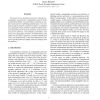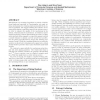10 search results - page 2 / 2 » Automated Security Proofs with Sequences of Games |
SP
2008
IEEE
13 years 3 months ago
2008
IEEE
e an abstraction of zero-knowledge protocols that is le to a fully mechanized analysis. The abstraction is formalized within the applied pi-calculus using a novel equational theor...
CSFW
2007
IEEE
13 years 11 months ago
2007
IEEE
We present a new mechanized prover for showing correspondence assertions for cryptographic protocols in the computational model. Correspondence assertions are useful in particular...
POPL
2009
ACM
14 years 5 months ago
2009
ACM
As cryptographic proofs have become essentially unverifiable, cryptographers have argued in favor of developing techniques that help tame the complexity of their proofs. Game-base...
SOUPS
2009
ACM
13 years 11 months ago
2009
ACM
Randomness is a necessary ingredient in various computational tasks and especially in Cryptography, yet many existing mechanisms for obtaining randomness suffer from numerous pro...
SP
1998
IEEE
13 years 9 months ago
1998
IEEE
A strand is a sequence of events; it represents either the execution of legitimate party in a security protocol or else a sequence of actions by a penetrator. A strand space is a ...


